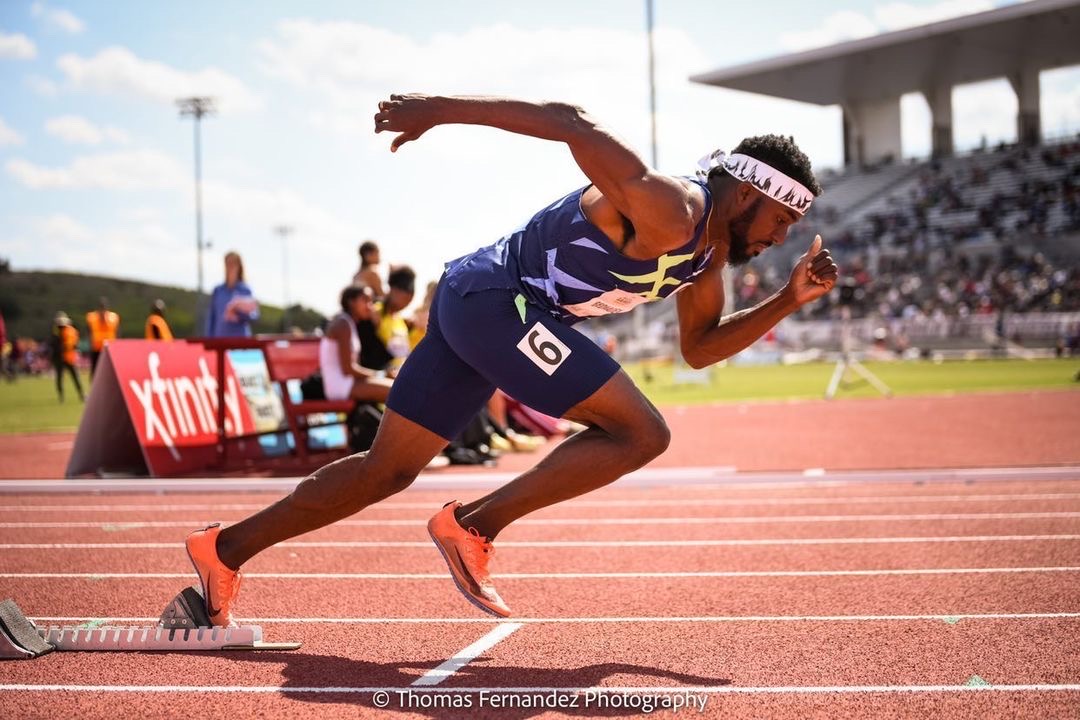
As a kid, Kenny Bednarek had a hard time sitting still.
In an interview for the 365 Amplified podcast, he said he was always “getting into trouble, running in the hallways and jumping over tables.” His mom decided to channel his energy into sports, specifically track, in elementary school.
Originally from Tulsa, Oklahoma, he and his twin brother were adopted at the age of 4 and later moved to Rice Lake, Wisconsin. His mom is white, and he has two sisters of different ethnic backgrounds as well.
“There’s a lot of diversity in my family,” he said. He grew up as one of only a few Black kids in school, and occasionally had to endure racist comments, but credits his family for helping him through.
“It wasn’t as difficult for me just because I had the support that I needed from them,” he said. “I didn’t really get surrounded by Black people in the sport until I went to college … I’ve had a little adversity, but I mean, I’m kind of the best from both worlds.”
Listen to the full interview on today’s podcast:
Bednarek, who will turn 26 next month, said track coach Jared Sasada first noticed something in him in ninth grade.
“He knew I had the talent in me to do something big in the sport,” Bednarek said. “I was always kind of the fastest kid in my grade. And then once I got onto the state level, it was like, ‘Okay, well, you’re good enough to go on the national level.’ So once he started taking me to the Junior Olympics, that kind of made me more hungry just to get better, just because then you realize, I’m not the best, I’m not the fastest, and you want to be the best.”
He was certainly among the best in Wisconsin as a high school athlete, winning seven individual state titles and leading his team to a 4×400 relay championship. His 20.43 was the number one high school 200-meter time in the nation in 2018. He still holds state records in the 100, 200 and 400.
After high school, Bednarek did what many track athletes do: start at community college with hopes of landing an NCAA scholarship. He had his sights set on the University of Oregon after going to Indian Hills Community College in Ottumwa, Iowa, where the team trained on a local high school track.
“When I initially got there, I was ashamed, because there’s that notion of going to junior college, you must be a dumb person or a failed athlete or something like that,” he said. “And when I finally got there, I kind of just embraced it, like, Hey, this is the hand I felt like. I’m in this situation now, and I’m going to make the most of it.”
And make the most of it he did. In May 2019, at the National Junior College Athletic Association national championships, he ran a wind-aided 19.49 in the 200, following up with a legal 19.82 into a headwind, then a 44.73 in the 400 to win national titles in both events – becoming the first American and only second person in world history to run a sub-20 200 and a sub-45 400 on the same day.
Those times raised some eyebrows around the track world.
“That’s when all the agents started hitting me up, and the shoe deals started coming in, and it was kind of like, okay, well, I guess I’m going pro now,” he said. “It wasn’t set in stone where I was like, ‘Okay, I want to go pro’. But once that opportunity came, then I was like, ‘Okay, let’s do it.” He signed with Nike and hit the pro circuit after just one year in junior college – a rare path to the pro ranks.

That was 2019; two years later he was an Olympic silver medalist at the Tokyo 2020 games (which actually took place in 2021 due to the COVID-19 pandemic).
The whole Olympic experience didn’t hit him then, he said, just because much of the pageantry was missing. Paris last month, though, was a different story.
“Once we went to Paris, and went to the opening ceremony, I think that’s where it kind of hit me. It’s like, Oh, wow. Like, I’m an Olympian,” he said. “To be able to go twice, and to medal, I mean, it’s a dream come true.”

The Olympics also has a practical benefit: that’s where track athletes can really move the needle on their own fortunes. The increased recognition every four years can lead to additional endorsement deals.
There’s a lot of running to do between Olympics, though. Bednarek was in Zurich and soon on his way to Brussels during the interview, competing in the Diamond League, a European professional track tour. He won the season championship in the 200 in 2021 and is aiming to get back on top this season.
“One thing I like about this whole situation is I get to travel the world and do the one thing that I love most, which is running,” he said. “When I do have time, which is most of the time, I always try to make a point in actually traveling around the actual country and the city that I’m in.”
Bednarek always runs with his signature headband, always representing the city where he’s competing. At last week’s Diamond League meet in Zurich, for example, the headband was adorned with the city’s coat of arms; in Poland, it featured the Polish flag.
Asked what advice he’d give young athletes, he pointed to three things: “stay disciplined, work hard and be dedicated. Those three things are going to make you successful.”
There’s one more, thing, too: “Have fun. When you have fun, then the hard work won’t be as hard.”



